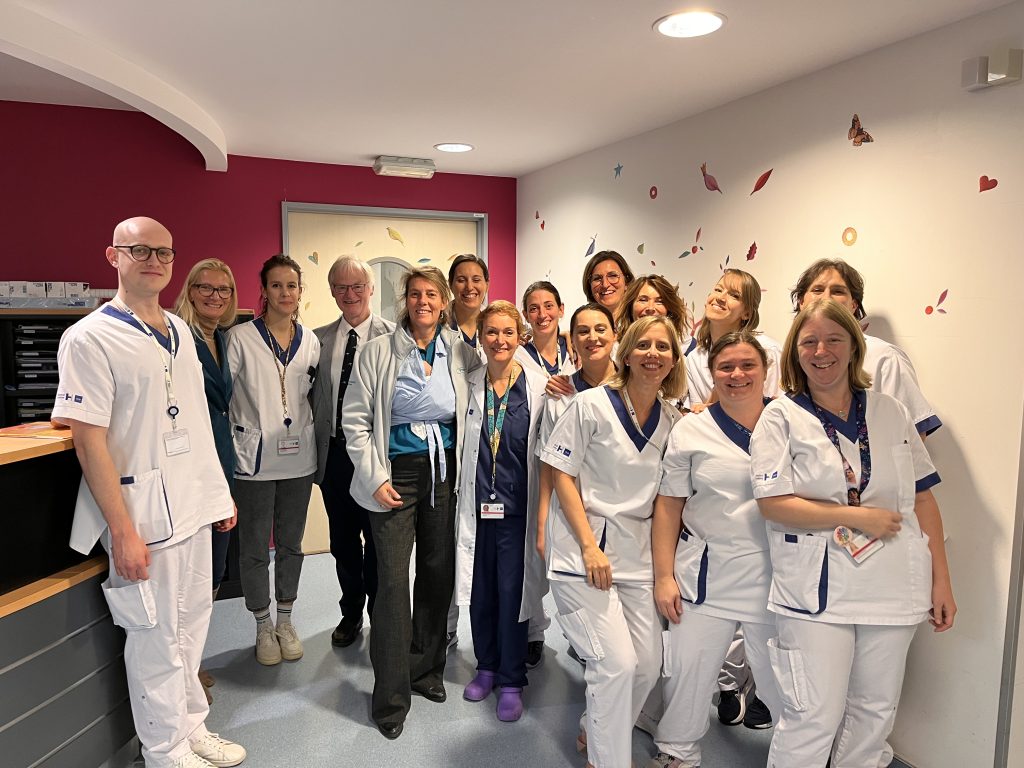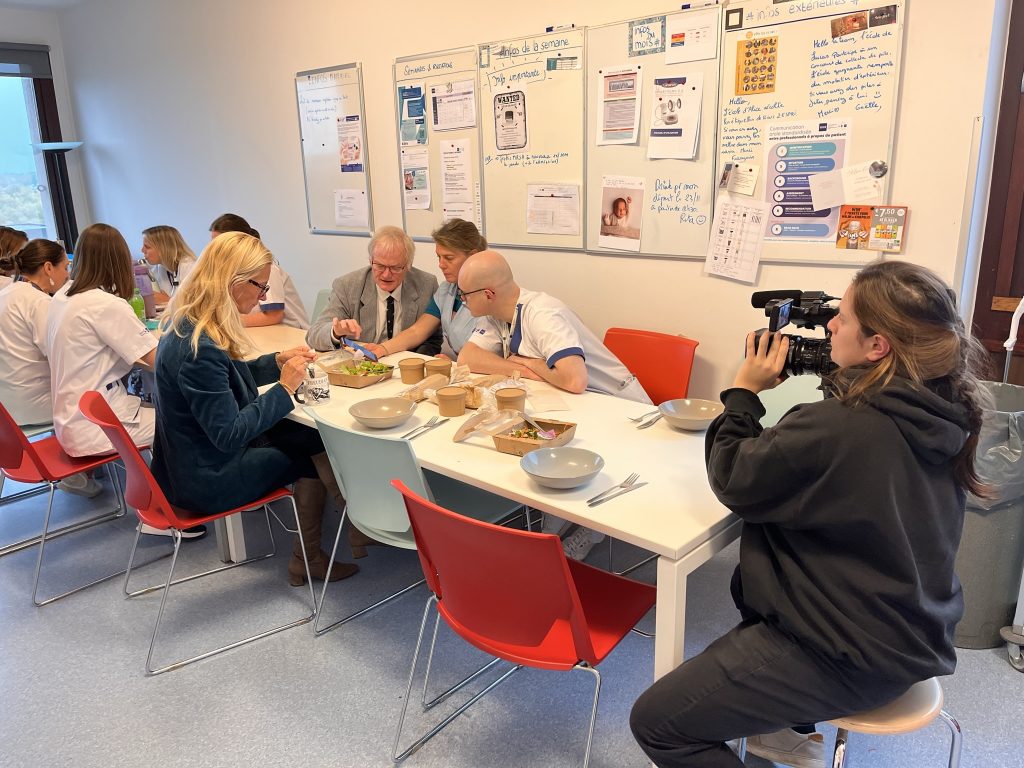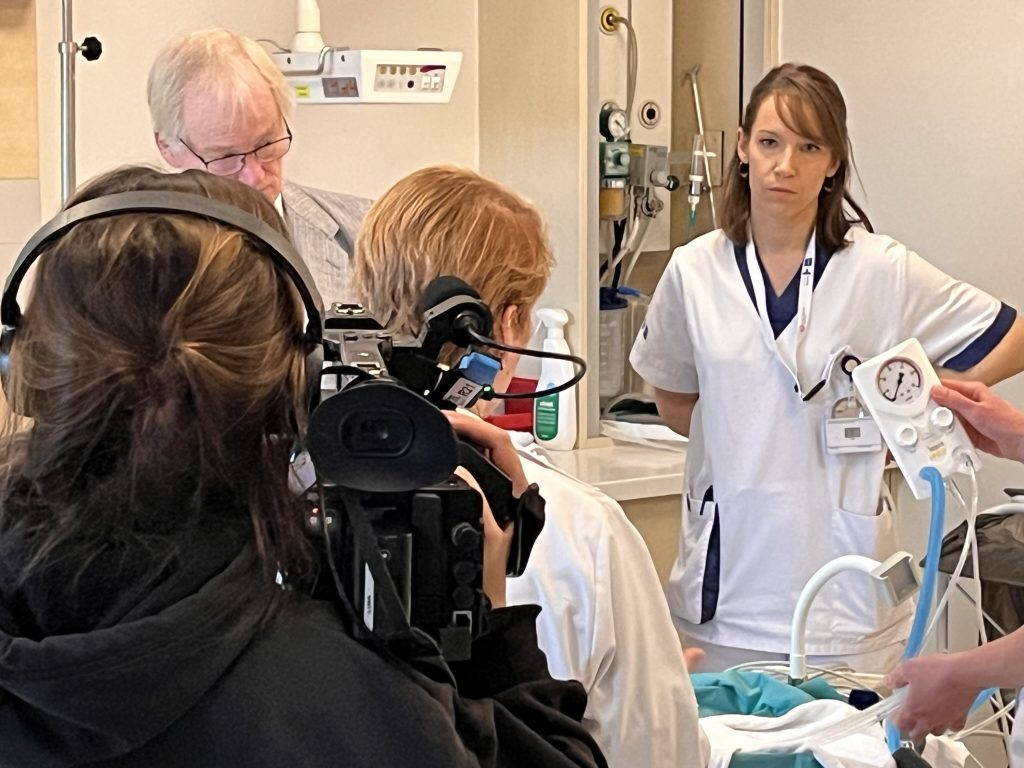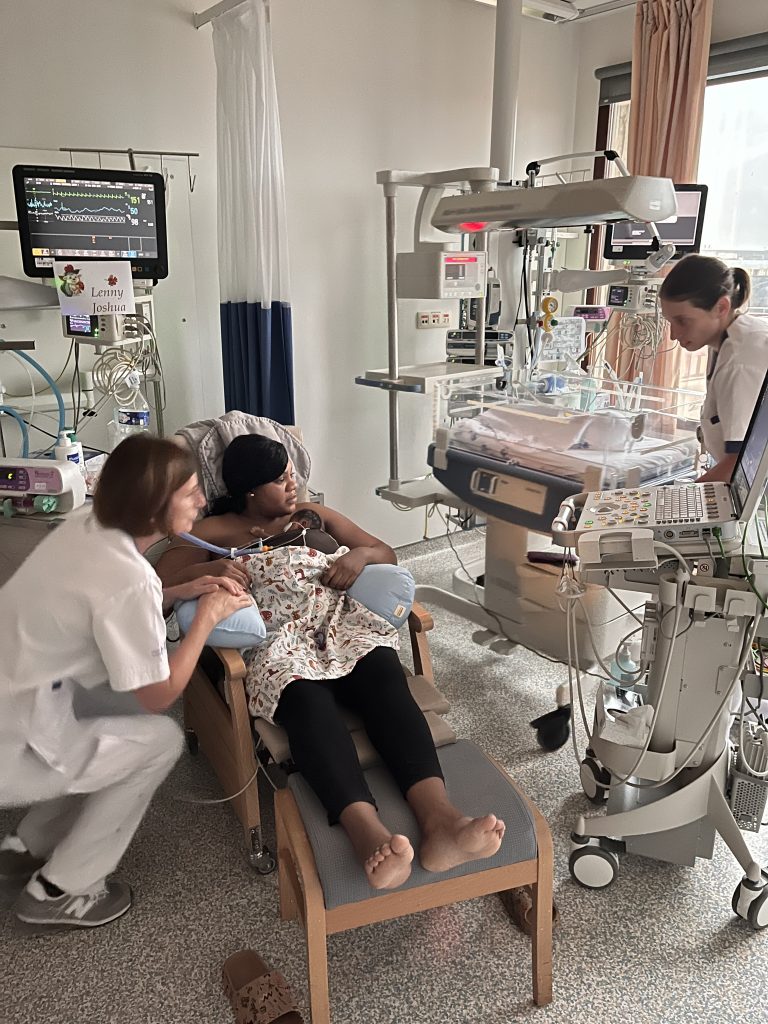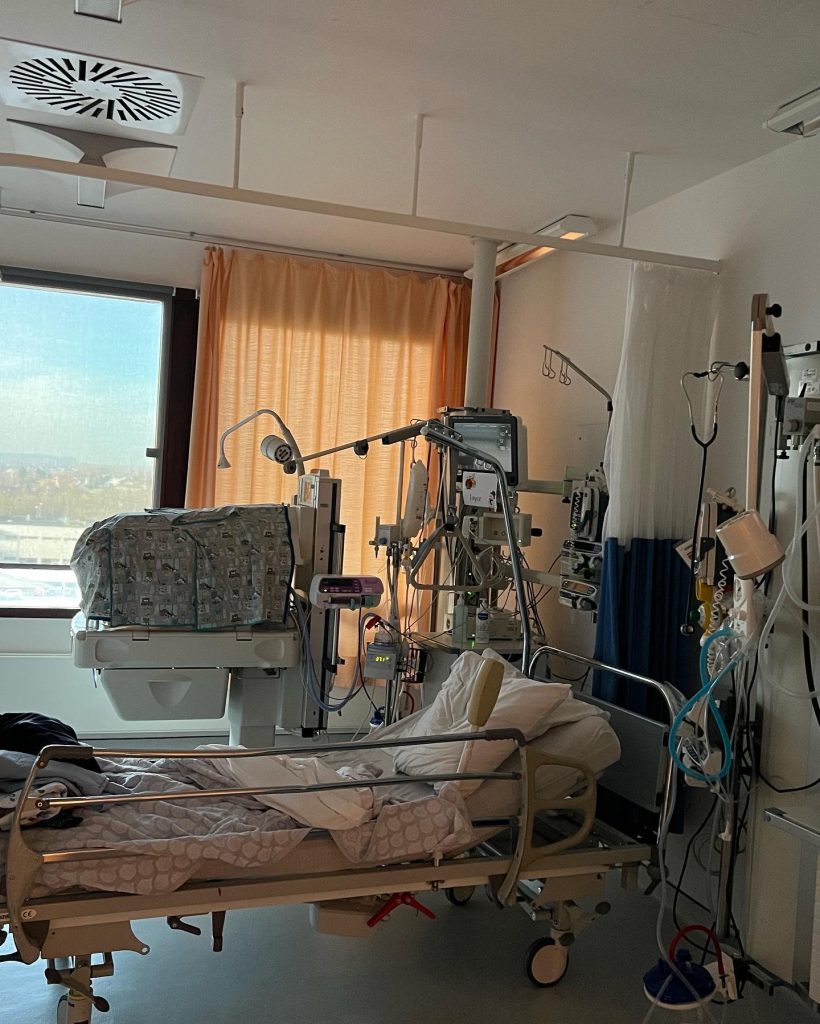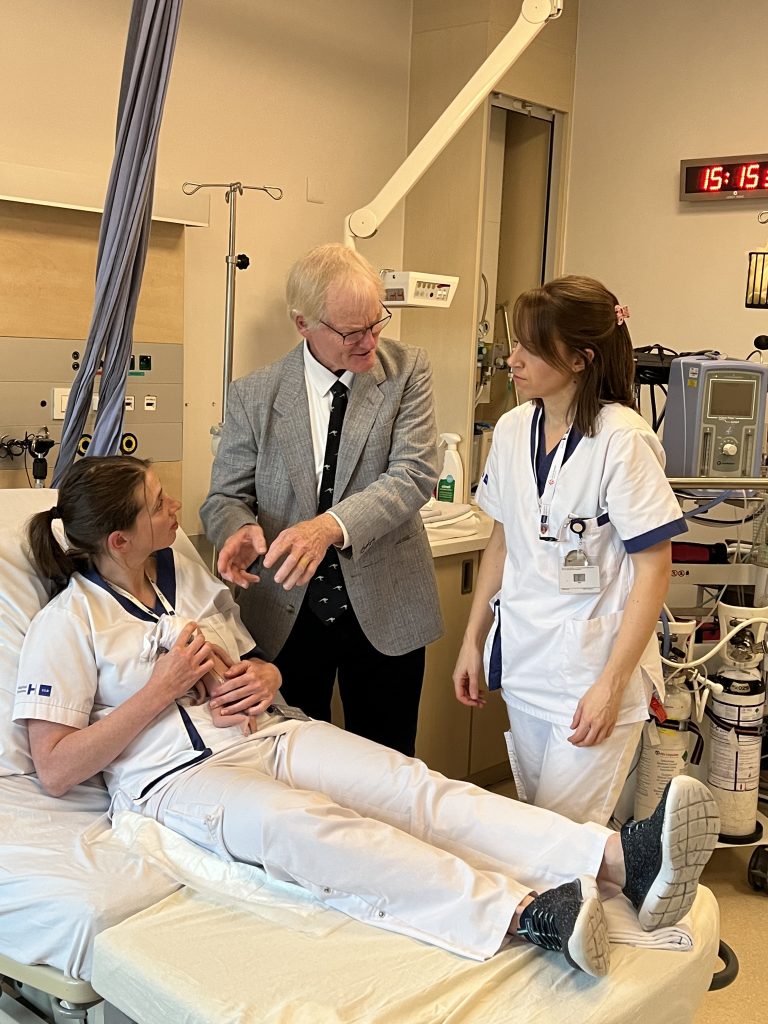Guest article by Lívia Nagy Bonnard, founding member of “Melletted a helyem Egyesület” – “Right(s) Beside You Association” in English – and a member of the Parent, Patient and Public Advisory Board of the European Standards of Care for Newborn Health (ESCNH).
During each NICU visit, I think to myself, “If my son had been treated here, in this ward, as an extremely preterm baby, how different – or better – would my NICU experience have been? Would there have been less trauma? Would my son have had a healthier start to adulthood?”
If I were to rank the NICUs I have visited all over the world, perhaps the one closest to my heart would be the neonatal intensive care unit at Erasmus Hospital in Brussels. You might link my partiality for the hospital to Dr. Dorottya Kelen, the Hungarian neonatologist who is also the head of the department. The answer is yes and no. Dorka’s personality, her professional dedication, and the humanity she exudes are immediately apparent as soon as you enter this department. She does not even need to be there; her dedication is felt by the entire staff. I have been to this NICU on several occasions, and it is heart-warming to feel the calm that pervades the entire ward.
Making skin-to-skin contact hospital policy
My last visit will stay with me for a lifetime because I witnessed something out of the ordinary. At the invitation of parent organisation “Noah’s Ark Belgium”, internationally renowned expert and neonatologist Dr. Nils Bergman came to visit the NICU in person. While we were there, Belgian TV station RTL was filming a documentary on the hospital’s unique provision of immediate skin-to-skin contact and zero separation care after birth. During filming, they interviewed Dr. Bergman, who followed the demonstration step by step, exchanging experiences about the professional and technical implementation with Dr. Dorottya Kelen, Dr. Clotilde Lamy, the head of the obstetrics ward, and Emilie Huet, the NICU’s head nurse. At the end of the day, Dr. Bergman expressed his sincere admiration and appreciation that the commitment of staff and hospital management has resulted in immediate skin-to-skin contact now being a policy benefitting the tiny patients in the maternity ward of a relatively busy hospital.
- © Livia Nagy Bonnard
- © Noah’s Ark Belgium
- © Noah’s Ark Belgium
Empowering families
Our vision is to see the focus of care firmly placed on the preterm or sick newborn baby and his or her family. I believe that this is fully realised in Erasmus Hospital in Brussels. One grandmother, clutching the hand of Laetitia van der Elst, a founder of parent organisation “Noah’s Ark Belgium”, tearfully told the story of her granddaughter’s birth and her difficult start in life. She then revealed that she had been coming to the ward day after day for almost three weeks before she found out that the woman who constantly spoke to her, who advised her on how to support her daughter and granddaughter was, in fact, not a nurse but Dr. Kelen, the head of the NICU.
I was able to be part of a baby’s discharge home – always a highly emotional moment for staff and family – and had the privilege of taking the photo of them leaving the NICU as a family. I do not have this memory. In fact, I do not have many photos from our NICU time, and I am greatly missing them now, 18 years later. I always found it difficult to showcase our 14 weeks’ NICU journey to Antoine, to his sisters, and to the family and friends. I saw those parents with a big smile; I am sure they felt relief, “Finally we go home, TOGETHER, with a baby in our arms”. But I am pretty sure they must have felt some stress also, “This is really happening; we are responsible for this little baby from now on”. But they had been prepared for the next chapter of their life.
These stories illustrate beautifully how the entire staff at Erasmus Hospital works together to support and empower families to take over as many aspects of their newborn’s care as possible so that they feel competent and capable when it finally becomes time to go home.
- © Livia Nagy Bonnard
- © Livia Nagy Bonnard
- © Livia Nagy Bonnard
Advocating for systemic change
It has taken many years of joint effort, hard work, and consistent training to make this department a truly family- and baby-friendly service with a cohesive team of doctors and nurses who, for example, have lunch together every day to strengthen their bonds and ways of interacting and communicating. I have had the privilege of being a part of the daily life of the Erasmus NICU on several occasions and I can say without any bias that I wish my son had been born here 18 years ago…
Laetitia van der Elst and Michel Collart, the founders of “Noah’s Ark Belgium”, share those thoughts, telling me, “We ask ourselves a similar question every single day: If our son had been treated here, in this ward, as an extremely preterm baby … and if Laetitia had not been separated from our son for a whole week … maybe … just maybe … Noah would still be with us”.
It is these thoughts and similar experiences which drive Laetitia, Michel, and me to advocate so strongly for Zero Separation and infant- and family-centred developmental care in the way that we do. We want to see see lasting improvements in neonatal and maternal care and advocate for systemic change. Seeing that it is possible for hospitals like Erasmus Hospital in Brussels to reorganise the way it treats and cares for the most vulnerable gives us hope.
What makes the NICU so special
The NICU has the following professional criteria in its daily care:
- Infant- and family-centred developmental care:
- Parents are not visitors; parents are integrated into the care of their newborn.
- At the heart of the unit’s philosophy is the active involvement of parents.
- Day or night, 24 hours a day, parents can be partners in their child’s care. With the help of the nurses, they understand and learn to interpret their child’s behavioural cues to be able to take care of their child after discharge at home as a competent parent.
- Grandparents and siblings can visit daily.
- Psychological and emotional support:
- The constant supportive presence of a psychologist and the nursing team as well as the peer-parent meetings organised by the nursing staff and “Noah’s Ark Belgium” provide an opportunity for discussion and sharing of experiences.
- The objective is to strengthen parents’ mental health and equip them to deal with challenges in the future.
- Developmental care:
- Several members of the nursing staff have received NIDCAP training, making it easier to deliver developmentally supportive care.
- The whole NICU environment contributes to the harmonious development of the baby.
- The baby’s environment is adapted to his/her cues, behaviour, and individual needs. For example, light is adapted to the child’s needs, noise levels are reduced, physiological and comfortable positioning is ensured, care and medical interventions are organised according to the child’s needs and tolerance.
- Sleep phases are not disturbed. Instead, the NICU practices flexible scheduling according to the newborn’s individual rhythm.
- Skin-to-skin care:
- Skin-to-skin contact is a unique and important moment (or rather, therapy) for the baby’s physical and emotional development.
- It gives him/her better physiological stability, increases REM sleep periods, and improves the short and long-term development of the nervous system. Skin-to-skin contact also means fewer infections, less pain, less crying, better weight gain and earlier discharge home.
- Other benefits include more successful breastfeeding, a stronger parent-child bond and attachment, and a greater sense of security for the baby through a familiar, reassuring environment.
- Skin-to-skin contact begins immediately after birth on the mother’s belly or chest, where the baby is stabilised.
- Pain management:
- Every year, the staff of the unit organise a “Pain Conference” to which all NICUs in Belgium are invited. Speakers from other French-speaking (France, Swiss, Canada etc.) areas are often invited as well.
- Pain management and its prevention and relief are carried out according to a protocol in the unit.
- The entire team attaches great importance to personalised pain relief, using both non-pharmacological methods (sugar solution combined with sucking (pacifier), pads, skin-to-skin contact, and breastfeeding) and pharmaceutical methods.
- Parents are also involved in identifying, assessing, and relieving the baby’s pain.
- Breastfeeding support:
- The hospital respects the informed, conscious choice of parents of how they want to feed their newborn baby. Erasmus Hospital has been awarded as “Baby Friendly Hospital” which promotes breastfeeding. The entire nursing staff team supports mothers to breastfeed their babies.
- Lactation consultants work with mothers and are responsible for:
- giving information and discussing problems with the parents,
- answering any questions that may arise,
- monitoring breastfeeding,
- helping to breastfeed the baby,
- helping to initiate breastfeeding or to maintain breast milk.
- Human milk bank:
- Erasmus Hospital runs its own milk bank from which the NICU regularly receives milk donations from other mothers.
- The milk is checked and pasteurised and then given to newborns in need.

